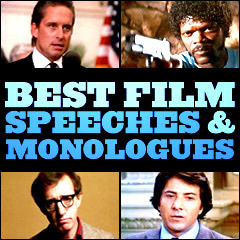|
Best Film Speeches and Monologues
|
|
Title Screen
|
Film Title/Year and Description of Film Speech/Monologue |
Screenshots
|
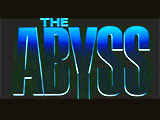
|
The Abyss
(1989)
Screenwriter(s): James Cameron
 "LIVE!" "LIVE!"
The famous, emotionally raw resuscitation scene
in which husband Virgil "Bud"
Brigman (Ed Harris) valiantly refused to accept estranged wife
Lindsey's (Mary Elizabeth Mastrantonio) death by drowning while
trying to revive her. After a few jolts, he began chest compressions
by hand. He was told: "It's all over, man," but he
asserted:
No! No, she has a strong heart! She wants
to LIVE! C'mon, Linds! C'mon baby! Zap her again! Do it!...
Do it!... Come on baby, come on baby!... Come on, breathe
baby. Goddamn it, BREATHE! Goddamn it, you bitch, you never
backed away from anything in your life! Now fight! Fight!
Fight! Right now! Do it! FIGHT, GODDAMN IT! FIGHT! FIGHT!
Fiiiiiiiiiiight! Fiiiiiiiiiiight!
That's it, that's it, Lindsey. That's it, Linds, you can
do it. That's it, Linds, come back, baby. Come on. You
can do it, baby.
|
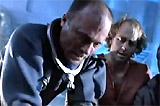
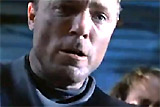
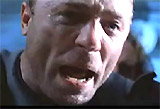
|

|
The Abyss
(1989)
Screenwriter(s): James Cameron
 "I'll
Always Be With You" "I'll
Always Be With You"
Aggressive and outspoken Lindsey's (Mary Elizabeth
Mastrantonio) heartfelt and reassuring messages to her estranged
husband Virgil "Bud" Brigman (Ed Harris), relayed
to him as he descended dangerously into a deep ocean trench
to disarm a nuclear warhead, and began hallucinating as he
set the record for the deepest suit dive:
Bud. There are some, some things I need
to say. It's hard for me, you know. It's not easy being
a cast-iron bitch. Takes discipline and years of training.
A lot of people don't appreciate that. Jesus, I'm sorry
I can't tell you these things to your face. I have to wait
till you're alone in the dark, freezing, and there's feet
of water between us. I'm sorry. I'm-- I'm rambling....Bud,
how are you doing?...No, Bud, I'm not going away, I'm right
here...I am right here with you, Bud. Bud, this is Lindsey.
Please. I'm right here with you. Okay? So try and stay
calm. I'm right here. All right? Bud?...B-Bud, it's the
pressure. All right? You have to listen to my voice. You
have to try. Concentrate. All right? Just listen to my
voice. Please.... Bud-- I'm not getting anything!...Bud,
I know how alone you feel. Alone in all that cold blackness.
But I'm there in the dark with you. Oh, Bud, you're not
alone. Oh, God.
Do you remember that time -- you were pretty
drunk. You probably don't remember. The power went out
in that little apartment we had on Orange Street. We were
staring at that one little candle and I said something
really dumb, like, "That
candle is me," like -- like every one of us is out
there alone in the dark in this life. And you just -- you
just lit up another candle and put it beside mine ... and
you said, "No! See, that's me. That's me." We
stared at the two candles, and then -- Well, if you remember
any of this, I'm sure you remember the next part. But there
are two candles in the dark. I'm with you. I'll always
be with you, Bud. I promise that....Bud, now come on, you
hangin' in there? You have to talk to me, Bud, please!
I need to know if you're OK...You see light? What kind
of light, Bud?... Bud, do you hear me? You drop your weights
and start back now, Bud. That gauge could be wrong. Do
you hear me? Just drop your weights and start back now.
Your gauge could be wrong! Your gauge could be wrong. You
drop your weights and start back now. No, you won't stay
there. Do you hear me? You drop your weights. You can breathe
shallow. Do you hear me? Bud, please, listen to me, please.
God-damn it, you dragged me back from that bottomless pit.
You can't leave me here alone now. Please, oh, God, Virgil,
please. Please. I love you.
|

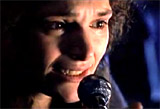
|
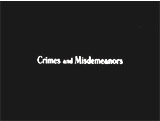
|
Crimes & Misdemeanors
(1989)
Screenwriter(s): Woody Allen
 Thoughts
on Moral Choices Thoughts
on Moral Choices
Play clip (excerpt): 
Philosophy Professor Louis Levy's (Martin S.
Bergmann, a non-actor and therapist friend of Woody Allen)
closing monologue (in voice-over) about moral choices - during
a final montage of scenes from the film.
The final scene was
a wedding, in which the blind rabbi Ben (Sam Waterston), a
patient of ophthalmologist Dr. Judah Rosenthal (Martin Landau),
danced with his daughter, a new bride. Levy discussed the interconnectedness
of moral choices and human happiness:
We are all faced throughout our lives with
agonizing decisions, moral choices. Some are on a grand
scale, most of these choices are on lesser points. But
we define ourselves by the choices we have made. We are,
in fact, the sum total of our choices. Events unfold so
unpredictably, so unfairly. Human happiness does not seem
to have been included in the design of creation. It is
only we, with our capacity to love that give meaning
to the indifferent universe. And yet, most human beings
seem to have the ability to keep trying and even to find
joy from simple things, like their family, their work,
and from the hope that future generations might understand
more.
|
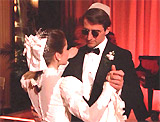
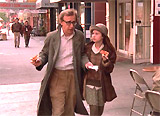
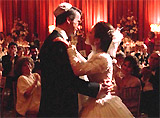
|

|
Dead Poets Society
(1989)
Screenwriter(s): Tom Schulman
 "Gather
Ye Rosebuds While Ye May" - "Carpe Diem" - "Seize
the Day!" "Gather
Ye Rosebuds While Ye May" - "Carpe Diem" - "Seize
the Day!"
Play clip (excerpt): 
Inspiring but unorthodox Welton Academy English
teacher John Keating (Robin Williams) spoke to his male prep
school students after taking them out of the classroom into
the main entranceway or hallway. He had them first discuss
the phrase "Carpe Diem" (or "Seize the Day")
from a hymnal (page 542), then had them approach glass display
cases filled with trophies, footballs, and team pictures. He
emphasized that they should make the most of their short lives:
'O Captain, my Captain.' Who knows where
that comes from? Anybody? Not a clue? It's from a poem
by Walt Whitman about Mr. Abraham Lincoln. Now in this
class, you can either call me Mr. Keating, or if you're
slightly more daring, O Captain, my Captain. Now let me
dispel a few rumors so they don't fester into facts. Yes,
I too attended Hell-ton and survived. And no, at that time
I was not the mental giant you see before you. I was the
intellectual equivalent of a ninety-eight pound weakling.
I would go to the beach and people would kick copies of
Byron in my face....
'Gather ye rosebuds while ye may.' The Latin
term for that sentiment is Carpe Diem. Now who knows what
that means?...Seize the day. Gather ye rosebuds while ye
may. Why does the writer use these lines?...Because we are
food for worms, lads. Because, believe it or not, each and
every one of us in this room is one day gonna stop breathing,
turn cold, and die.
Now I would like you to step forward over here
and peruse some of the faces from the past. You've walked
past them many times. I don't think you've really looked
at them.
They're not that different from you, are they?
Same haircuts. Full of hormones, just like you. Invincible,
just like you feel. The world is their oyster. They believe
they're destined for great things, just like many of you.
Their eyes are full of hope, just like you. Did they wait
until it was too late to make from their lives even one iota
of what they were capable? Because you see gentlemen, these
boys are now fertilizing daffodils. But if you listen real
close, you can hear them whisper their legacy to you. Go
on, lean in. Listen. Do you hear it? (whispering in a gruff voice)
Carpe. Hear it? (whispering) Carpe. Carpe Diem. Seize
the day boys. Make your lives extraordinary.
|

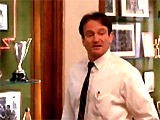
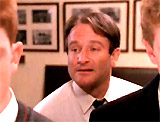
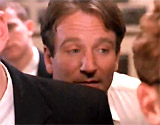
|

|
Dead Poets Society
(1989)
Screenwriter(s): Tom Schulman
 "Poetry,
Beauty, Romance, Love, These Are What We Stay Alive For" "Poetry,
Beauty, Romance, Love, These Are What We Stay Alive For"
Play clip (excerpt): 
Later, during one of his classes with the same
poetry students, after he had them rip out the entire introduction
to their Pritchard 'Introduction to Poetry' textbooks, teacher
John Keating (Robin Williams) explained why they should 'read
and write poetry':
Excrement. That's what I think of Mr. J.
Evans Pritchard. We're not laying pipe, we're talking about
poetry. How can you describe poetry like American Bandstand?
I like Byron, I give him a 42, but I can't dance to it.
Now I want you to rip out that page. Go on, rip out the
entire page. You heard me, rip it out. Rip it out! Go on,
rip it out....Gentlemen, tell you what, don't just tear
out that page, tear out the entire introduction. I want
it gone, history. Leave nothing of it. Rip it out. Rip!
Begone J. Evans Pritchard, Ph.D. Rip, shred, tear. Rip
it out. I want to hear nothing but ripping of Mr. Pritchard.
We'll perforate it, put it on a roll. It's not the Bible,
you're not gonna go to hell for this. Go on, make a clean
tear, I want nothing left of it....Rip it out, rip!...I
don't hear enough rips....Keep ripping, gentlemen. This
is a battle, a war. And the casualties could be your hearts
and souls. (collecting scraps of paper in a metal wastebasket)
Thank you, Mr. Dalton. Armies of academics going forward,
measuring poetry. No, we will not have that here. No more
of Mr. J. Evans Pritchard. Now in my class, you will learn
to think for yourselves again. You will learn to savor
words and language. No matter what anybody tells you, words
and ideas can change the world. I see that look in Mr.
Pitt's eye, like 19th Century literature has nothing to
do with going to business school or medical school. Right?
Maybe. Mr. Hopkins, you may agree with him, thinking 'Yes,
we should simply study our Mr. Pritchard and learn our
rhyme and meter and go quietly about the business of achieving
other ambitions.' I have a little secret for ya. Huddle
up. Huddle up!
We don't read and write poetry because it's
cute. We read and write poetry because we are members of
the human race. And the human race is filled with passion.
Medicine, law, business, engineering, these are noble pursuits,
and necessary to sustain life. But poetry, beauty, romance,
love, these are what we stay alive for. To quote from Whitman:
'O me, o life of the questions of these recurring, of the
endless trains of the faithless, of cities filled with the
foolish. What good amid these, o me, o life?' Answer: that
you are here. That life exists, and identity. That the powerful
play goes on, and you may contribute a verse. That the powerful
play goes on and you may contribute a verse. What will your
verse be?
|
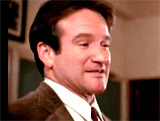
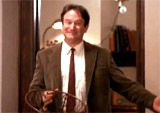
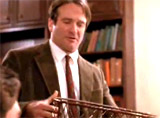
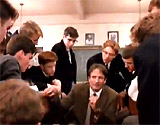
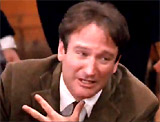
|

|
Dead Poets Society
(1989)
Screenwriter(s): Tom Schulman
 "The
Difficulty in Maintaining Your Own Beliefs in the Face of
Others" - On Conformity "The
Difficulty in Maintaining Your Own Beliefs in the Face of
Others" - On Conformity
In the outdoor courtyard of the Welton School,
three of Keating's students were striding along, accompanied
by the clapping cadence of others applauding. They all engaged
in a military march led by their teacher, while shouting out:
"I don't know but I've been told, Doin' poetry is old," after
which he delivered a lesson about conformity:
Thank you, gentlemen. If you noticed, everyone
started off with their own stride, their own pace. Mr.
Pitts taking his time. He knew he'll get there one day.
Mr. Cameron you could see him thinking, 'Is this right?
It might be right. It might be right. I know that. Maybe
not. I don't know.' Mr. Overstreet driven by a deeper force.
Yes. We know that. All right. Now, I didn't bring them
up here to ridicule them. I brought them up here to illustrate
the point of conformity: the difficulty in maintaining
your own beliefs in the face of others.
Now, those of you - I see the look in your
eyes like, 'I would've walked differently.' Well, ask yourselves
why you were clapping. Now, we all have a great need for
acceptance. But you must trust that your beliefs are unique,
your own, even though others may think them odd or unpopular,
even though the herd may go, 'That's baaaaad.' Robert Frost
said, 'Two roads diverged in a wood and I, I took the one
less traveled by, and that has made all the difference.'
Now, I want you to find your own walk right now. Your own
way of striding, pacing. Any direction. Anything you want.
Whether it's proud, whether it's silly, anything. Gentlemen,
the courtyard is yours.
|
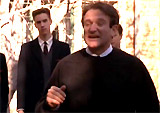
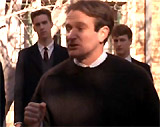
|
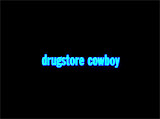
|
Drugstore
Cowboy (1989)
Screenwriter(s): Gus Van Sant, Daniel Yost
 Hallucinating
Drug Effect - "Life Was Beautiful" Hallucinating
Drug Effect - "Life Was Beautiful"
Dope user Bob Hughes' (Matt Dillon) hallucinatory
experience after shooting up his arm in the back seat of a
car, with his voice-over and floating images:
After any kind of drug haul, everyone in
the crew indulged. I laughed to myself as I pictured blues
and Dilaudid in such great amounts on the spoon that it
would literally be overflowing. Upon entering my vein,
the drug would start a warm itch that would surge along
until the brain consumed it in a gentle explosion. It began
in the back of the neck and rose rapidly until I felt such
pleasure that the whole world sympathized and took on a
soft, lofty appeal. Everything was grand then. Your worst
enemy -- he wasn't so bad. The ants in the grass -- they
were just, you know, doin' their thing. Everything took
on the rosy hue of unlimited success. You could do no wrong,
and as long as it lasted, life was beautiful.
|

|
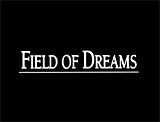
|
Field
of Dreams (1989)
Screenwriter(s): Phil Alden Robinson
 "That's
My Wish" "That's
My Wish"
Dr. Archibald
"Moonlight" Graham's (Burt Lancaster in his last theatrical
film role) poignant wish, in the year 1972, to fulfill his lifelong
dream: a chance to bat in the major leagues that had been denied
him:
Graham: It was like coming this close to
your dreams, and then watch them brush past you like a
stranger in a crowd. At the time, you don't think much
of it. You know, we just don't recognize the most significant
moments of our lives while they're happening. Back then
I thought, 'Well, there'll be other days.' I didn't know
that that was the only day. And now, Ray Kinsella, I want to ask
you a question. What's so interesting about a half an
inning that would make you come all the way from Iowa to talk to
me about it fifty years after it happened?
Ray: I really didn't know till just now, but I think
it's to ask you if you could do anything you wanted, if you could
have a-a wish...
Graham: And you're the kind of man who could grant
me that wish?
Ray: I don't know. I'm just asking.
Graham: Well, you know, I-I never got to bat in the major
leagues. I'd have liked to have had that chance, just once,
to stare down a big-league pitcher. To stare him down, and
then just as he goes into his windup - wink! Make him think
you know something he doesn't. That's what I wish for. The
chance to squint at a sky so blue that it hurts your eyes
just to look at it, to feel the tingle in your arms as you
connect with the ball, to run the bases, stretch your double
into a triple, and flop face-first into third, wrap your
arms around the bag. That's my wish, Ray Kinsella, that's
my wish. And is there enough magic out there in the moonlight
to make this dream come true?
Ray: What would you say if I said yes?
Graham: I think I'd actually believe you.
Ray: Well, sir, there's a place where things like that happen,
and if you want to go, I can take you.
Graham: This is my most special place in all the world, Ray.
Once a place touches you
like this, the wind never blows so cold again. You feel for it, like
it was your child. I can't leave Chisholm...I was born here, I lived
here. I'll die here, but no regrets....Son, if I'd only gotten to
be a doctor for five minutes, now that would have been a tragedy.
|
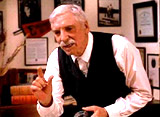

|

|
Field
of Dreams (1989)
Screenwriter(s): Phil Alden Robinson
 The
One Constant Through All the Years - Baseball ("Part
of Our Past), and "People Will Come" The
One Constant Through All the Years - Baseball ("Part
of Our Past), and "People Will Come"
Play clip (excerpt):  (short) (short)
Play clip (excerpt):  (long) (long)
Disillusioned, controversial
and reclusive Boston author Terence Mann's (James Earl Jones)
poignant "People
will come" speech to idealistic, transplanted city boy-turned-farmer
Ray Kinsella (Kevin Costner) at the side of his baseball diamond
manufactured in the middle of an Iowa cornfield - an elucidation
about the purpose of the game of baseball in American history,
to help Ray seek out the meaning of the voices and the purpose
of the ball field in the face of foreclosure:
Ray. People will come, Ray. They'll come
to Iowa for reasons they can't even fathom. They'll turn
up your driveway, not even sure why they're doing it. They'll
arrive at your door, as innocent as children, longing for
the past. 'Of course, we won't mind if you look around,'
you'll say. 'It's only $20 per person.' They'll pass over
the money without even thinking about it. For it is money
they have and peace they like...Then they'll walk out to
the bleachers and sit in their shirt sleeves on a perfect
afternoon. They'll find they have reserved seats somewhere
along one of the baselines where they sat when they were
children, and cheered their heroes, and they'll watch the
game, and it'll be as if they'd dipped themselves in magic
waters. The memories will be so thick, they'll have to
brush them away from their faces... People will come, Ray...
The one constant through all the years, Ray, has been baseball.
America has rolled by like an army of steamrollers. It's
been erased like a blackboard, rebuilt, and erased again.
But baseball has marked the time. This field, this
game, is a part of our past, Ray. It reminds us of all
that once was good, and it could be again. Ohhhh, people
will come, Ray. People will most definitely come..
|
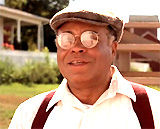
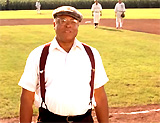

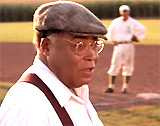
|
